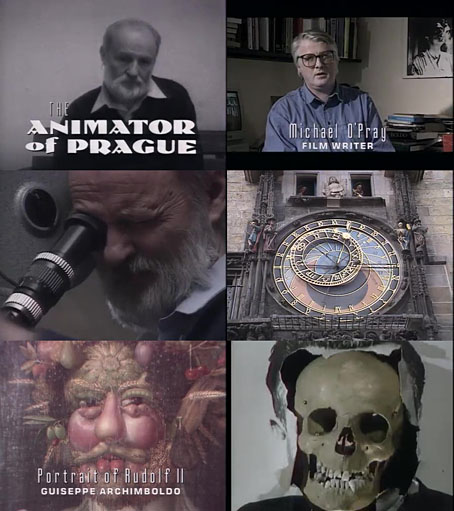“Surrealism is not aesthetics. It is a philosophy,” says Jan Svankmajer in James Marsh’s short (25 mins) portrait for the BBC from 1990. This was broadcast at a time when Svankmajer’s films were receiving more attention in the UK than they had before or since, thanks in part to Channel 4’s screening and funding of animation, and to the late Michael O’Pray, a film writer and champion of avant-garde cinema. O’Pray is the main commentator here apart from Svankmajer himself, and his name was a regular fixture of any writing about Svankmajer or the Brothers Quay in the 1980s. Svankmajer’s films were featured in at least two of the touring programmes of short films that O’Pray put together for Film and Video Umbrella in the late 1980s, so its good to see his enthusiasm memorialised in this way, even if it is stuck on a rather temperamental Korean website. In addition to discussion of the influence of Bohemian emperor Rudolf II on Svankmajer’s work we also see the director filming his latest short, The Death of Stalinism in Bohemia; a rare glimpse behind the camera. (Note: the video wouldn’t load for me but the stream is downloadable if you’re determined to see it.)
Previously on { feuilleton }
• Jan Svankmajer, Director
• Don Juan, a film by Jan Svankmajer
• The Pendulum, the Pit and Hope
• Two sides of Liska
• The Torchbearer by Václav Svankmajer


The title reminds me of Angela Carter’s dedication to Svankmajer in her tale, ALICE IN PRAGUE; OR, THE CURIOUS ROOM. I am sometimes struggling to decide what I like more: his short films or his feature length films. Like you, I do think that his short films are his best, because he can explore a variety of philosophies and emotions, as well as showcase his endless creativity. LUNCH always makes me hungry, and VIRILE GAMES never fails to amuse me. The short films of Svankmajer are simply incomparable (although, if I had to pick one, I would almost certainly go with the Brothers Quay, since their own unique aesthetic, quite distinct from Svankmajer’s, somehow speaks to me more on a subconscious level).
Yes, I think his abrasive style works best in short doses (although I love his take on Alice in Wonderland): all the jabbering puppets in the Faust film become annoying after an hour.
I’m always going to prefer the Quays over JS, of course, since their aesthetic is unique. The biggest criticism you could make of Svankmajer is that his work is often too didactic; when the moral punchline has been delivered the film loses some of its appeal. His best films, like Jabberwocky, don’t have a moral punchline.